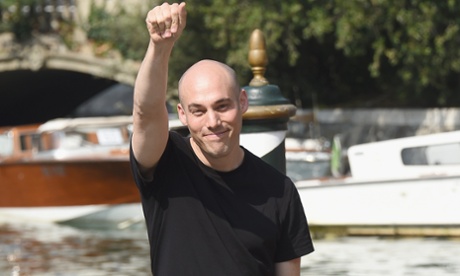
The outside world came to gatecrash the glamour on the opening night of the Venice film festival. In the evening sunshine, local police were summoned to shield the red-carpet arrivals from a boisterous protest by 2,000 public sector workers. Elsewhere, the dignitaries sought shelter in front of The Look of Silence, a stark, unsparing documentary about the Indonesian genocide. The protesters’ air-horns and placards merely pointed the way to the horrors within.
The Look of Silence is Joshua Oppenheimer’s follow-up to his Bafta-winning The Act of Killing, in which he cajoled elderly killers into memorialising their crimes via a series of self-styled gangster movies and musicals. This time, the director has switched the focus to spotlight the survivors and to honour the dead. He examines the ongoing consequences of Indonesia’s 1965 military coup and shows that its worst offenders remain at large and unpunished.
“The military dictatorship is still in power,” Oppenheimer explained. “So much has not changed in Indonesia. We hope the film will help that change.”
Oppenheimer’s film charts the investigation of Adi Rukun, a middle-aged optometrist whose elder brother was killed during his homeland’s purge of supposed communist sympathisers. Rukun goes door-to-door through his family’s rural district, fitting his subjects with corrective lenses and interviewing the guilty. The route leads him from the former leader of the death squad who admits to drinking the blood of his victims to the local politician who boasts that he has never lost an election. Some subjects flinch when confronted with their crimes. Others accuse Rukun of indulging in “communist activity”.
“I only wanted the people to admit what they did and acknowledge they were wrong, so that we would somehow be able to forgive each other,” Rukun told reporters in Venice. “We live in a community that is split by mutual suspicion and fear. I really want this to end.”
Oppenheimer claimed that Rukun risked his own life by appearing on camera. “The film exposes Adi Rukun, who is a man of extraordinary dignity and courage, to grave personal danger,” he said. “To mitigate this risk, his family has now had to move to another part of Indonesia, thousands of miles away.” Most of the film’s Indonesian crew, he added, are not named in the credits: “The crew remain anonymous to protect their own safety.”
Official response to The Act of Killing, Oppenheimer’s previous documentary, has thus far been muted. The director claimed that, having initially ignored it, the authorities were finally forced to make a statement after the film was nominated for an Oscar last January.
“They released an admission that basically said they that what had happened [during the anti-communist purges] was wrong, but that they would deal with it in their own time,” Oppenheimer said. “That was a huge change, even if it was reluctantly done.”
Born in Texas but based in Denmark, Oppenheimer has spent the past 10 years researching the Indonesian genocide. With the completion of The Look of Silence, the director finally feels ready to put the subject behind him. He conceded, however, that the decision was not entirely his to make. He has made too many enemies and rattled too many skeletons. “I’m persona non grata in Indonesia now,” he said. “I know I will no longer be able to return.”
• Full coverage: The Act of Killing

